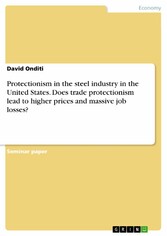Protectionism in the steel industry in the United States. Does trade protectionism lead to higher prices and massive job losses?
von: David Onditi
GRIN Verlag , 2019
ISBN: 9783668961463
, 21 Seiten
Format: PDF
Kopierschutz: frei
Preis: 15,99 EUR
eBook anfordern 
Mehr zum Inhalt

Protectionism in the steel industry in the United States. Does trade protectionism lead to higher prices and massive job losses?
Seminar paper from the year 2019 in the subject Business economics - Economic Policy, grade: A+, University of South Australia (McGill), course: International Business, language: English, abstract: The central research question is linked to the implications of protectionism in the steel industry in the US. The hypothesis is that trade protectionism leads to higher prices and massive job losses. The case study design is employed as is allows for the in depth understanding and examination of the steel industry in the US and the implications of the trade policies on the jobs as well as prices. The research applied archival research method applying a mixed methodology. The findings of the research indicate that the application of protectionism in the steel sector would harm not only the consumers but the industry being protected. It can be concluded that protectionism has negative implications in terms of higher prices and loss of jobs. The project was restricted by the research design as the use of a single case study limits the comparability and thus the generalizability of the results. The research focused only on the steel industry in the US thus restricting the applications of the findings in other sectors or industries in the US or even the steel industries in other countries. The research implies that trade policies in the US should favor the use of market forces dictated by the principles of the WTO rather than focusing on the nationalism of the economies. The economic nationalism in the United States has risen in the past couple of years, fueled by and fueling the election of President Donald Trump. With the increased call for nationalism of the economies comes the view that protectionism has achieved great success in the history of the United States. However, the calls for greater protectionism ignores the vast amounts of academic analysis and contemporary reporting that indicates that the trade protectionism in the United States has led to immense economic costs on the economy and the American consumers.











